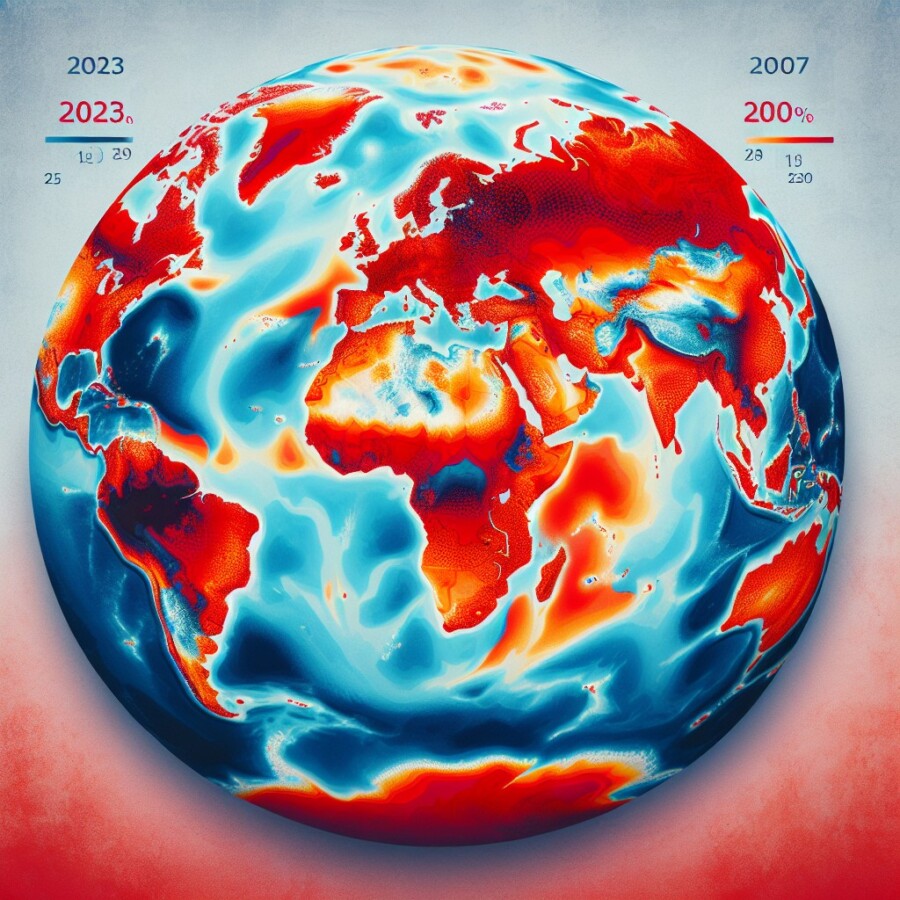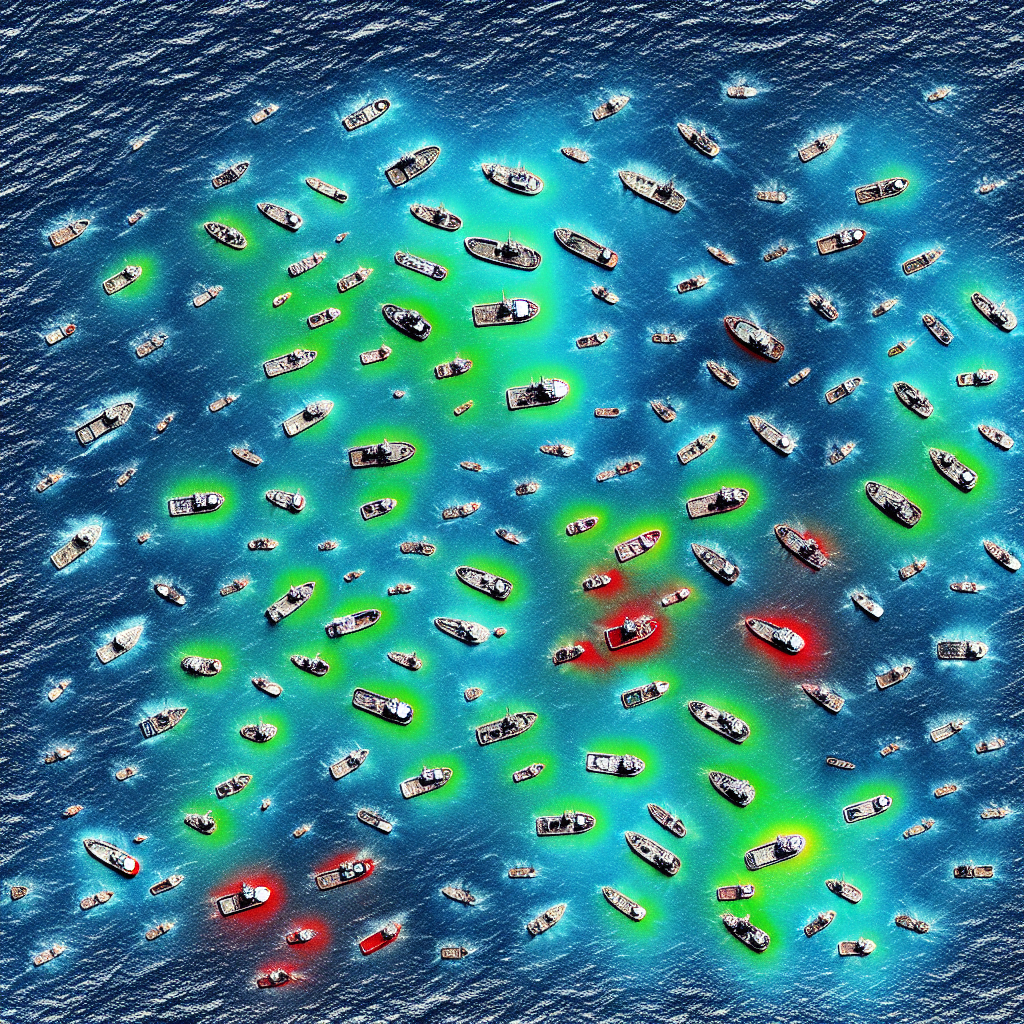The year 2023 was super hot, like the hottest ever! It beat all the previous records because of climate change caused by humans and this thing called El Niño. The European Union’s climate service said that 2023 was about 1.48C hotter than the average temperature before people started burning a lot of fossil fuels. Almost every day since July, the global air temperature has been reaching new highs, and the sea is also getting really warm. Even in the UK, it was the second hottest year ever. These crazy high temperatures are getting us closer to breaking important climate goals.
What’s really crazy about 2023 is not just that it broke the old records, but by how much! It was way hotter than anyone expected. The world has been getting warmer over the past hundred years because of greenhouse gases in the air. But scientists didn’t predict that 2023 would be the hottest year. It’s hard to figure out exactly what the climate is going to do because it’s so complicated.
At the beginning of 2023, only a few days were hotter than usual. But in the second half of the year, almost every day set a new record for temperature. More than 200 days had the hottest temperatures ever for that time of year. This happened because of El Niño, which is when the Pacific Ocean gets warmer and releases more heat into the air. But scientists didn’t think El Niño would have such a big effect until 2024, so they’re not sure why 2023 was so hot.
The whole world felt the heat in 2023. Almost every part of the world was hotter than usual, and that’s on top of the fact that the average temperature has already gone up by 0.9C since before people started using a lot of fossil fuels. This crazy heat made extreme weather events like heatwaves, wildfires, droughts, and floods happen more often and in weird times of the year. It caused a lot of damage and even cost lives.
Not only did the air get hotter in 2023, but other signs of climate change also hit record levels. The ice in Antarctica was the lowest it’s ever been, glaciers in North America and Europe melted a lot, and the surface of the ocean was the hottest it’s ever been. This caused a bunch of marine heatwaves. The ocean has been breaking records since May 4th, 2023.
We don’t know for sure if 2024 will be hotter than 2023 because of this El Niño thing. But there’s a chance it could be even hotter and go past the important 1.5C warming limit for the whole year.
Original news source: 2023 confirmed as world’s hottest year on record (BBC)
🎧 Listen:
Slow
Normal
Fast
📖 Vocabulary:
| 1 | climate | The usual weather conditions in a particular area |
| 2 | fossil fuels | Energy sources like coal, oil, and natural gas that were formed from the remains of ancient plants and animals |
| 3 | greenhouse gases | Gases in Earth’s atmosphere that trap heat and contribute to warming |
| 4 | predict | To say what you think will happen in the future |
| 5 | complicated | Having many parts or aspects that are usually interrelated, making something hard to understand or deal with |
| 6 | record | The highest or lowest degree of something ever measured |
| 7 | El Niño | A weather pattern that happens when the Pacific Ocean gets unusually warm and affects the weather around the world |
| 8 | effect | A change that is a result or consequence of an action or other cause |
| 9 | average | The typical or normal amount, calculated by adding several amounts together and dividing the total by the number of amounts |
| 10 | extreme | Very severe or serious |
| 11 | heatwaves | Periods of excessively hot weather, which may be accompanied by high humidity |
| 12 | droughts | Long periods of time when there is very little or no rain |
| 13 | glaciers | Huge masses of ice, found in cold regions, that move very slowly down valleys or spread outward on land |
| 14 | marine | Related to the sea or ocean |
| 15 | limit | The maximum point or degree that is allowed or possible |
Group or Classroom Activities
Warm-up Activities:
– News Summary
Instructions: Divide the class into pairs or small groups. Give each group a few minutes to read the article. Then, ask each group to summarize the main points of the article in their own words. Have them write a short news summary, highlighting the key information and events. Afterward, ask each group to share their summary with the class.
– Opinion Poll
Instructions: Divide the class into pairs or small groups. Give each group a few minutes to read the article. Then, ask each group to discuss their opinions on the topic of climate change and the record-breaking temperatures in 2023. Provide prompts such as “Do you think humans are primarily responsible for climate change?” or “What actions can individuals take to combat climate change?” After the discussion, conduct a class-wide opinion poll by asking each group to share their opinions and reasons for their stance.
– Vocabulary Pictionary
Instructions: Select 10-15 key vocabulary words from the article (e.g. climate change, greenhouse gases, El Niño, heatwaves, etc.) Write each word on a separate small piece of paper and place them in a bowl or hat. Divide the class into teams and explain that each team will take turns selecting a word from the bowl. The chosen team member must draw a picture to represent the word, while their team tries to guess the word within a time limit. Encourage teams to use the words in sentences or describe their meanings to help their teammates guess correctly.
– Keyword Hangman
Instructions: Select 5-10 important keywords from the article (e.g. climate change, temperature, El Niño, fossil fuels, etc.) Write a series of dashes on the board to represent each letter in the keyword. Ask the class to guess letters one at a time. If a guessed letter appears in the keyword, write it in the appropriate position. If the letter does not appear in the keyword, draw a body part of a hangman on the board. The class must guess the keyword before the hangman is completed. After each keyword is guessed, discuss its meaning and relevance to the article.
– Future Predictions
Instructions: Divide the class into pairs or small groups. Ask each group to discuss and make predictions about the future impacts of climate change based on the information in the article. Prompt them to consider questions such as “How do you think climate change will affect different parts of the world?”, “What are some potential consequences of rising temperatures?”, or “What actions can be taken to mitigate the effects of climate change?” After the discussion, ask each group to share their predictions with the class and facilitate a class-wide discussion on the topic.
🤔 Comprehension Questions:
1. Why was the year 2023 considered the hottest ever?
2. What caused the increase in temperatures in 2023?
3. Why were scientists surprised by how hot 2023 was?
4. When did the hottest temperatures in 2023 occur?
5. What is El Niño and how did it contribute to the high temperatures in 2023?
6. How did the extreme heat in 2023 affect the world?
7. What are some other signs of climate change that reached record levels in 2023?
8. Is it possible that 2024 could be even hotter than 2023?
Go to answers ⇩
🎧✍️ Listen and Fill in the Gaps:
The year 2023 was super hot, like the hottest ever! It beat all the previous records because of (1)______ change (2)______ by humans and this thing called El Niño. The European Union’s climate service said that 2023 was about 1.48C (3)______ than the average temperature before people started burning a lot of fossil fuels. Almost every day since July, the (4)______ air temperature has been reaching new highs, and the sea is also getting really warm. Even in the UK, it was the second hottest year ever. These crazy high temperatures are getting us closer to breaking important climate goals.
What’s really crazy about 2023 is not just that it broke the old (5)______, but by how much! It was way hotter than anyone expected. The world has been getting (6)______ over the past hundred years because of greenhouse gases in the air. But scientists didn’t predict that 2023 would be the hottest year. It’s hard to figure out exactly what the climate is (7)______ to do because it’s so complicated.
At the (8)______ of 2023, only a few days were hotter than usual. But in the second half of the year, almost every day set a new record for temperature. More than 200 days had the hottest temperatures ever for that time of year. This happened because of El Niño, which is when the Pacific Ocean gets warmer and releases more heat into the air. But scientists didn’t (9)______ El Niño would have such a big effect until 2024, so they’re not sure why 2023 was so hot.
The whole world felt the heat in 2023. Almost every part of the world was hotter than usual, and that’s on top of the fact that the average temperature has already gone up by 0.9C since before (10)______ started using a lot of fossil fuels. This crazy heat made extreme (11)______ events like heatwaves, wildfires, droughts, and floods happen more often and in (12)______ times of the year. It caused a lot of damage and even cost lives.
Not only did the air get hotter in 2023, but other signs of climate change also hit record levels. The ice in Antarctica was the lowest it’s ever been, glaciers in North (13)______ and Europe melted a lot, and the surface of the (14)______ was the hottest it’s ever been. This caused a bunch of marine heatwaves. The ocean has been breaking records since May 4th, 2023.
We don’t know for sure if 2024 will be hotter than 2023 because of this El Niño thing. But there’s a chance it could be even hotter and go past the important 1.5C (15)______ limit for the (16)______ year.
Go to answers ⇩
💬 Discussion Questions:
Students can ask a partner these questions, or discuss them as a group.
1. How would you feel if the year you were living in was the hottest year ever recorded?
2. Do you think humans are responsible for the hot temperatures in 2023? Why or why not?
3. What are some possible consequences of extreme heat and climate change?
4. How do you think the increase in temperature affects the environment and wildlife?
5. Do you like hot weather? Why or why not?
6. What do you think can be done to prevent further increases in temperature?
7. How do you think the record-breaking temperatures in 2023 affected people’s daily lives?
8. What is El Niño and how does it impact the climate?
9. How do you think climate change and extreme heat affect agriculture and food production?
10. How do you think the increase in temperature affects human health and well-being?
11. What can individuals do to contribute to reducing climate change and extreme heat?
12. How do you think the record-breaking temperatures in 2023 affected animals and their habitats?
13. How would you feel if the temperature continued to increase every year?
14. Do you think the effects of climate change are reversible? Why or why not?
15. What do you think should be the priority in addressing climate change: reducing greenhouse gas emissions or adapting to the changes? Why?
Individual Activities
📖💭 Vocabulary Meanings:
Match each word to its meaning.
Words:
1. climate
2. fossil fuels
3. greenhouse gases
4. predict
5. complicated
6. record
7. El Niño
8. effect
9. average
10. extreme
11. heatwaves
12. droughts
13. glaciers
14. marine
15. limit
Meanings:
(A) Long periods of time when there is very little or no rain
(B) Having many parts or aspects that are usually interrelated, making something hard to understand or deal with
(C) The usual weather conditions in a particular area
(D) To say what you think will happen in the future
(E) The highest or lowest degree of something ever measured
(F) A weather pattern that happens when the Pacific Ocean gets unusually warm and affects the weather around the world
(G) Very severe or serious
(H) Energy sources like coal, oil, and natural gas that were formed from the remains of ancient plants and animals
(I) The typical or normal amount, calculated by adding several amounts together and dividing the total by the number of amounts
(J) Periods of excessively hot weather, which may be accompanied by high humidity
(K) Related to the sea or ocean
(L) The maximum point or degree that is allowed or possible
(M) A change that is a result or consequence of an action or other cause
(N) Gases in Earth’s atmosphere that trap heat and contribute to warming
(O) Huge masses of ice, found in cold regions, that move very slowly down valleys or spread outward on land
Go to answers ⇩
🔡 Multiple Choice Questions:
1. Why was 2023 the hottest year ever recorded?
(a) The European Union’s climate service predicted it
(b) The world has been getting warmer over the past hundred years
(c) Climate change caused by humans and El Niño
(d) The average temperature has already gone up by 0.9C
2. What is El Niño?
(a) A type of greenhouse gas in the air
(b) A record-breaking heatwave
(c) The lowest ice level in Antarctica
(d) When the Pacific Ocean gets warmer and releases more heat into the air
3. How did scientists feel about 2023 being the hottest year?
(a) They didn’t predict it would be the hottest year
(b) They were confident it would be the hottest year
(c) They were unsure about the effects of El Niño
(d) They expected 2024 to be even hotter
4. When did the global air temperature start reaching new highs?
(a) Since the beginning of 2023
(b) Since May 4th, 2023
(c) Since before people started using a lot of fossil fuels
(d) Since July of 2023
5. What were some extreme weather events that happened more often in 2023?
(a) Hurricanes, blizzards, earthquakes, and tsunamis
(b) Heatwaves, wildfires, droughts, and floods
(c) Tornadoes, hailstorms, thunderstorms, and avalanches
(d) Snowstorms, landslides, hurricanes, and earthquakes
6. How did the ocean react to the high temperatures in 2023?
(a) It had marine heatwaves and was the hottest it’s ever been
(b) It froze and caused a decrease in sea levels
(c) It remained the same temperature as previous years
(d) It caused a rise in sea levels and flooding
7. What is the important warming limit that 2024 might exceed?
(a) 0.9C
(b) 2.0C
(c) 1.5C
(d) 1.0C
8. How did the high temperatures in 2023 affect the UK?
(a) It had the lowest ice level in Antarctica
(b) It was the second hottest year ever recorded
(c) It caused extreme weather events like heatwaves and floods
(d) It broke all the previous temperature records
Go to answers ⇩
🕵️ True or False Questions:
1. Even in the UK, 2023 was not the second hottest year ever recorded.
2. These extremely high temperatures are bringing us closer to surpassing important climate goals.
3. The European Union’s climate service reported that 2023 was 1.48C hotter than the average temperature before the increase in fossil fuel usage.
4. The global air temperature has been inconsistently reaching new highs since July, and the sea is also cooling down significantly.
5. The second half of 2023 did not see almost every day setting a new record for temperature, with only a few days experiencing the hottest temperatures ever recorded for that time of year.
6. The effects of El Niño, which typically occur in 2024, were unexpectedly felt in 2023, contributing to the extreme heat.
7. The year 2023 was not the hottest year ever recorded, failing to break previous records due to climate change caused by humans and El Niño.
8. 2023 was hotter than expected, surprising scientists who have been observing a gradual increase in global temperatures over the past century.
Go to answers ⇩
📝 Write a Summary:
Write a summary of this news article in two sentences.
Check your writing now with the best free AI for English writing!
Writing Questions:
Answer the following questions. Write as much as you can for each answer.
Check your answers with our free English writing assistant!
1. What caused the year 2023 to be the hottest ever?
2. How much hotter was 2023 compared to the average temperature before people started burning fossil fuels?
3. Why were scientists surprised that 2023 was the hottest year?
4. What weather events were more common in 2023 due to the extreme heat?
5. What were some other signs of climate change that occurred in 2023?
✅ Answers
🤔✅ Comprehension Question Answers:
1. Why was the year 2023 considered the hottest ever?
2023 was considered the hottest year ever because the global air temperature reached new highs almost every day since July, and the sea also became extremely warm.
2. What caused the increase in temperatures in 2023?
The increase in temperatures in 2023 was caused by climate change caused by humans and a weather pattern called El Niño, which made the Pacific Ocean warmer and released more heat into the air.
3. Why were scientists surprised by how hot 2023 was?
Scientists were surprised by how hot 2023 was because they didn’t predict that it would be the hottest year. The climate is very complex and difficult to predict accurately.
4. When did the hottest temperatures in 2023 occur?
The hottest temperatures in 2023 occurred in the second half of the year, with more than 200 days setting new records for temperature.
5. What is El Niño and how did it contribute to the high temperatures in 2023?
El Niño is a weather pattern that occurs when the Pacific Ocean gets warmer and releases more heat into the air. It contributed to the high temperatures in 2023 by making the global air temperature even hotter than usual.
6. How did the extreme heat in 2023 affect the world?
The extreme heat in 2023 caused extreme weather events such as heatwaves, wildfires, droughts, and floods to occur more frequently and at unusual times of the year. It also caused a lot of damage and even cost lives.
7. What are some other signs of climate change that reached record levels in 2023?
Some other signs of climate change that reached record levels in 2023 were the lowest levels of ice in Antarctica, significant melting of glaciers in North America and Europe, and the hottest surface temperature of the ocean ever recorded.
8. Is it possible that 2024 could be even hotter than 2023?
It is possible that 2024 could be even hotter than 2023 due to the El Niño weather pattern. However, scientists are not certain and more research is needed to make accurate predictions.
Go back to questions ⇧
🎧✍️✅ Listen and Fill in the Gaps Answers:
(1) climate
(2) caused
(3) hotter
(4) global
(5) records
(6) warmer
(7) going
(8) beginning
(9) think
(10) people
(11) weather
(12) weird
(13) America
(14) ocean
(15) warming
(16) whole
Go back to questions ⇧
📖💭✅ Vocabulary Meanings Answers:
1. climate
Answer: (C) The usual weather conditions in a particular area
2. fossil fuels
Answer: (H) Energy sources like coal, oil, and natural gas that were formed from the remains of ancient plants and animals
3. greenhouse gases
Answer: (N) Gases in Earth’s atmosphere that trap heat and contribute to warming
4. predict
Answer: (D) To say what you think will happen in the future
5. complicated
Answer: (B) Having many parts or aspects that are usually interrelated, making something hard to understand or deal with
6. record
Answer: (E) The highest or lowest degree of something ever measured
7. El Niño
Answer: (F) A weather pattern that happens when the Pacific Ocean gets unusually warm and affects the weather around the world
8. effect
Answer: (M) A change that is a result or consequence of an action or other cause
9. average
Answer: (I) The typical or normal amount, calculated by adding several amounts together and dividing the total by the number of amounts
10. extreme
Answer: (G) Very severe or serious
11. heatwaves
Answer: (J) Periods of excessively hot weather, which may be accompanied by high humidity
12. droughts
Answer: (A) Long periods of time when there is very little or no rain
13. glaciers
Answer: (O) Huge masses of ice, found in cold regions, that move very slowly down valleys or spread outward on land
14. marine
Answer: (K) Related to the sea or ocean
15. limit
Answer: (L) The maximum point or degree that is allowed or possible
Go back to questions ⇧
🔡✅ Multiple Choice Answers:
1. Why was 2023 the hottest year ever recorded?
Answer: (c) Climate change caused by humans and El Niño
2. What is El Niño?
Answer: (d) When the Pacific Ocean gets warmer and releases more heat into the air
3. How did scientists feel about 2023 being the hottest year?
Answer: (a) They didn’t predict it would be the hottest year
4. When did the global air temperature start reaching new highs?
Answer: (d) Since July of 2023
5. What were some extreme weather events that happened more often in 2023?
Answer: (b) Heatwaves, wildfires, droughts, and floods
6. How did the ocean react to the high temperatures in 2023?
Answer: (a) It had marine heatwaves and was the hottest it’s ever been
7. What is the important warming limit that 2024 might exceed?
Answer: (c) 1.5C
8. How did the high temperatures in 2023 affect the UK?
Answer: (b) It was the second hottest year ever recorded
Go back to questions ⇧
🕵️✅ True or False Answers:
1. Even in the UK, 2023 was not the second hottest year ever recorded. (Answer: False)
2. These extremely high temperatures are bringing us closer to surpassing important climate goals. (Answer: True)
3. The European Union’s climate service reported that 2023 was 1.48C hotter than the average temperature before the increase in fossil fuel usage. (Answer: True)
4. The global air temperature has been inconsistently reaching new highs since July, and the sea is also cooling down significantly. (Answer: False)
5. The second half of 2023 did not see almost every day setting a new record for temperature, with only a few days experiencing the hottest temperatures ever recorded for that time of year. (Answer: False)
6. The effects of El Niño, which typically occur in 2024, were unexpectedly felt in 2023, contributing to the extreme heat. (Answer: True)
7. The year 2023 was not the hottest year ever recorded, failing to break previous records due to climate change caused by humans and El Niño. (Answer: False)
8. 2023 was hotter than expected, surprising scientists who have been observing a gradual increase in global temperatures over the past century. (Answer: True)
Go back to questions ⇧















